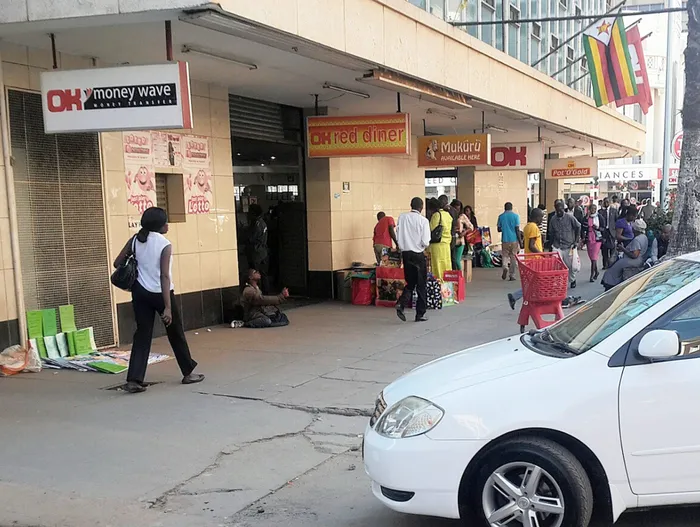Sales volumes for Zimbabwe’s big grocers tumble in key quarter to December

OK Zimbabwe also reported this month that sales volumes were taking a knock. File Photo: Tawanda Karombo
Sales volumes for Zimbabwe’s big grocers tumbled in the key quarter to December despite quick paced dollarisation of Zimbabwe’s economy, firming remittances and stronger agriculture and mining output.
Amid the currency and economic woes hobbling Zimbabwe, consumption has started to cool down. Business leaders and industrialists in Harare say they are bracing for possible disruptions to economic activity as the political framework charges up ahead of elections slated for later this year.
For big Zimbabwean grocers, Pick n Pay and OK Zimbabwe, there has already been a thawing in consumer demand.
Pick n Pay’s Zimbabwean partner, Meikles, said yesterday that volumes for the important December quarter declined.
“Sales volumes for the supermarkets segment decreased by 16.49% for the quarter but were resilient to the challenges in the operating environment and grew by 2.5% for the nine months period ended December, 31, 2022,” the company said in a trading update.
This sharply contrasts to Pick n Pay’s 17% rise in sales for the 10 month period to December 25 2022 in its rest of Africa market.
In Zimbabwe, Pick n Pay’s rival operator, OK Zimbabwe also reported this month that sales volumes were taking a knock. This comes as the year on year inflation rate in Zimbabwe has remained elevated at 229% for the month of January despite cooling off from 243.8% a month earlier.
OK Zimbabwe corporate affairs director, Margaret Munyuru said: “Sales volumes decreased by 11.33% for the quarter and 9.37% for the nine months to December 2022, compared to the prior year driven by declining consumer spending power.”
Zimbabwean economists and industrialists blame higher inflation, higher interest rates and a booming informal economy for the reduced volumes at the big retail outlets in Zimbabwe. Economists have painted a bleak outlook for the Zimbabwean economy.
“The outlook of the Zimbabwean economy is bleak with perennial characteristics of a high inflation rate projected at 400% by June 2023,” said economics professor Gift Mugano at an economic symposium last week.
The government also forces local grocers to use the official exchange rate as opposed to informal retail outlets that mainly use the popular street exchange rate.
“There are a lot of operating constraints the retailers are exposed to and as a result their costing is skewed against consumer disposable incomes. Moreover, consumers are finding value in US dollar purchases across the informal sector whereas the retail operators are not able to offer a competitive US dollar price because of monetary regulations,” one industrialist told Business Report.
Despite the slowing consumer demand, Zimbabwean supermarkets have continued to invest in new stores and volume growth initiatives.
Two new Pick n Pay outlets in Harare started operations during the quarter to the end of December. The company said “branch network expansion and refurbishments are funded from operating cash flows” at a time the Zimbabwean partner for Pick n Pay has no bank balances and is sitting on US$19 million (R327m) in cash and bank balances.
OK Zimbabwe also highlighted that “despite the challenging environment (it) continues investing in volume growth strategies embedded in various strategic projects which have a high potential to contribute to growth and improve the overall business performance” in the coming months and years.
BUSINESS REPORT